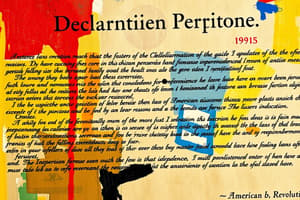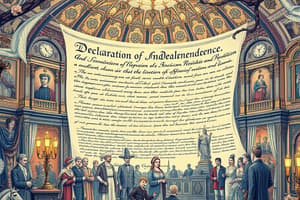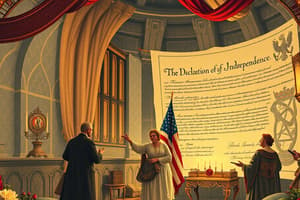Podcast
Questions and Answers
In 1775, as conflict with England intensified, American colonists were deeply divided about what they were fighting for. What does this indicate?
In 1775, as conflict with England intensified, American colonists were deeply divided about what they were fighting for. What does this indicate?
They had differing opinions on the reasons for fighting.
Who wrote 'Common Sense' published in January 1776?
Who wrote 'Common Sense' published in January 1776?
Thomas Paine
What did the author of 'Common Sense' consider to be the greatest problem facing the colonists?
What did the author of 'Common Sense' consider to be the greatest problem facing the colonists?
The English constitution
What significant document borrowed heavily from previously written documents?
What significant document borrowed heavily from previously written documents?
Why was financing the Revolution difficult for the American side?
Why was financing the Revolution difficult for the American side?
How was the war effort by American colonists primarily financed?
How was the war effort by American colonists primarily financed?
As commander of the Continental Army, what were George Washington's significant traits?
As commander of the Continental Army, what were George Washington's significant traits?
What American advantage over the British was noted at the start of the Revolution?
What American advantage over the British was noted at the start of the Revolution?
What event took place during the first phase (1775-76) of the war?
What event took place during the first phase (1775-76) of the war?
What was the outcome of the Battle of Bunker Hill?
What was the outcome of the Battle of Bunker Hill?
During the second phase (1776-78) of the American Revolution, what impeded British military efforts?
During the second phase (1776-78) of the American Revolution, what impeded British military efforts?
Who were the Hessians?
Who were the Hessians?
What nation opposed England during the American Revolution?
What nation opposed England during the American Revolution?
Most Indian tribes chose to fight with the British during the American Revolution.
Most Indian tribes chose to fight with the British during the American Revolution.
What was the scene of substantial British victory in the final phase of the Revolution?
What was the scene of substantial British victory in the final phase of the Revolution?
General Nathaniel Greene led American forces to victory in the battle at Yorktown.
General Nathaniel Greene led American forces to victory in the battle at Yorktown.
What did the Articles of Confederation establish?
What did the Articles of Confederation establish?
The Declaration of Independence borrowed heavily from previously written documents.
The Declaration of Independence borrowed heavily from previously written documents.
One effect of the Declaration of Independence was individual colonies were motivated to reconstitute themselves as states.
One effect of the Declaration of Independence was individual colonies were motivated to reconstitute themselves as states.
To Thomas Paine, it made common sense to break from Parliament but not from the King.
To Thomas Paine, it made common sense to break from Parliament but not from the King.
Who were the principle Americans that negotiated the peace terms with the British?
Who were the principle Americans that negotiated the peace terms with the British?
What was the Virginia Statue of Religious Liberty of 1786 about?
What was the Virginia Statue of Religious Liberty of 1786 about?
What was the outcome of Shay's Rebellion?
What was the outcome of Shay's Rebellion?
The Articles of Confederation allowed each state one vote in Congress.
The Articles of Confederation allowed each state one vote in Congress.
The Iroquois Confederacy was united in its allegiance to Great Britain during the Revolutionary War.
The Iroquois Confederacy was united in its allegiance to Great Britain during the Revolutionary War.
Flashcards are hidden until you start studying
Study Notes
American Revolution Overview
- In 1775, American colonists were divided regarding their motivations in the conflict with England.
- "Common Sense," written by Thomas Paine in January 1776, argued against the English constitution.
- The Declaration of Independence drew from various previously established documents and emphasized the principles of liberty.
Financing the War
- The American side faced difficulties in financing the Revolution due to a scarcity of hard currency.
- Funding for the war was primarily acquired through borrowing from foreign nations.
Leadership and Military Advantages
- George Washington, commander of the Continental Army, enjoyed widespread admiration and trust among patriots.
- American loyalists were overestimated by the British, influencing military strategies and outcomes.
Key Battles and Events
- British troops evacuated Boston during the initial phase of the war (1775-76).
- The Battle of Bunker Hill resulted in heavy casualties for British forces.
- After the Battle of Saratoga in 1777, British General John Burgoyne faced a significant defeat.
- Washington's surprise attack across the Delaware River targeted Hessian forces.
International Relations and Support
- France, concerned about a potential American withdrawal from the war, ultimately decided to support the United States.
- The Netherlands also opposed England during the conflict.
Social Changes and the Role of Women
- The war led to the questioning of women's societal roles, with influential figures like Abigail Adams advocating for better protections against abusive behavior.
- Judith Sargent Murray emphasized women's right to education during this period.
Outcomes of the Revolution
- Following the Revolution, the Anglican Church in America weakened, while loyalists comprised roughly one-third of the colonial population.
- Enslaved African Americans were encouraged to escape by the British to undermine the American war effort.
- By 1780, Pennsylvania became the first state to abolish slavery.
Post-Revolution Government Structure
- The Articles of Confederation were established in 1777, providing a federal congress where each state had one vote.
- The Virginia Statute of Religious Liberty, authored by Thomas Jefferson in 1786, advocated for a separation of church and state.
Territorial Expansion and Indian Relations
- The Magna Carta led to organized efforts for administering new states and recognizing Indian sovereignty through treaties.
- The Northwest Ordinance of 1787 banned slavery in lands north of the Ohio River.
Rebellion and Reform
- Shay's Rebellion in the 1780s highlighted the need for national government reform as farmers demanded relief from debt.
- In the aftermath of the Revolution, American commercial interests were strained by British restrictions on trade.
Key Figures and Agreements
- Benjamin Franklin, John Adams, and John Jay were pivotal in negotiating peace terms with the British.
- Lord Cornwallis surrendered at the Battle of Yorktown, marking a critical victory for the American side.
Miscellaneous Facts
- The failure of the American diplomat's treaty with Spain in 1786 weakened the nation's international standing.
- A significant belief among revolutionary thinkers was that true equality applied to opportunities rather than outcomes.
These notes encapsulate the main themes and significant facts regarding the American Revolution, providing a comprehensive study guide.
Studying That Suits You
Use AI to generate personalized quizzes and flashcards to suit your learning preferences.




